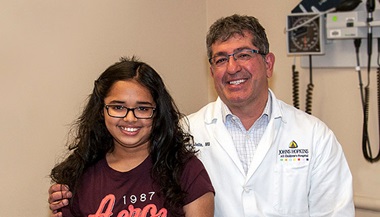Brain Tumors in Children: 8 Warning Signs You Should Know
When a child develops a brain tumor, early diagnosis is essential. Alan Cohen, M.D., director of pediatric neurosurgery at Johns Hopkins Children’s Center, shares the most common signs and symptoms that could point to a potential brain tumor.
1: Headache
Many children with a brain tumor experience headaches before their diagnosis. But a lot of children have headaches, and most of them don’t have a brain tumor. One red flag to watch out for: a headache that’s worse in the morning. This is partly because pressure in the brain increases when you’re lying down, and a tumor can make that worse.
2: Nausea and Vomiting
Nausea and vomiting are two common signs of the flu or flulike illnesses. However, in rare instances, these symptoms can be due to a brain tumor causing increased pressure inside the brain. If these symptoms persist or coincide with a headache, ask your child’s pediatrician for an expert medical opinion.
3: Sleepiness
A sleepy child isn’t usually cause for alarm. But pay attention to your gut instinct. If your child is acting lethargic, or extra sleepy, for no apparent reason, call your doctor for guidance on whether further evaluation may be necessary.
4: Vision, Hearing or Speech Changes
Depending on a brain tumor’s location, it can affect vision, hearing and speech. Of course, many children have challenges in these areas that have nothing to do with a brain tumor. Still, sudden changes in how your child sees, hears or talks should be evaluated by a medical professional.
5: Personality Changes
Personality changes can be a completely normal (if frustrating) part of parenting. In rare cases, they can be due to a brain tumor that’s affecting the cerebral cortex. If your child's mood swings or personality changes seem sudden or severe, tell your child’s pediatrician.
6: Balance Problems
If a tumor sits near the brain stem, it can cause balance problems. Tumbles and falls are a regular part of life for most toddlers. But severe or worsening balance problems in young children warrant a call to your doctor. If your older child suddenly has a hard time keeping his or her balance, a doctor can help you determine why.
7: Seizures
When a brain tumor sits on the surface of the brain, it can cause seizures. Many actions can trigger a seizure, including laughing. If your child is experiencing seizures, you should see a doctor. The cause may be a tumor or something else, but seizures must always be evaluated.
8: Increased Head Size
When babies are young, their skull bones haven’t fused (or grown together) yet. Because these bones are still malleable, a brain tumor could cause their head to grow in abnormal ways. If you notice a bulging on one side or any other severe changes to your baby’s head shape, your doctor can help you decide whether it requires further evaluation.
Brain Tumor Symptoms in Children: When to See a Doctor
Many of these symptoms can be caused by routine health conditions, and that’s most often the case. If you’re concerned about one or more of these symptoms in your child, seek out the medical opinion of a health professional you trust. Often, an MRI scan can determine whether a brain abnormality is causing the symptoms.
If your child does have a brain tumor, advanced pediatric neurosurgery can offer effective treatment and a successful recovery for the majority of young patients who have this rare condition.






